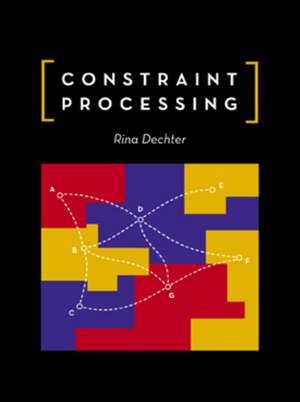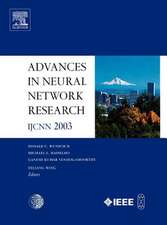Constraint Processing: The Morgan Kaufmann Series in Artificial Intelligence
Autor Rina Dechteren Limba Engleză Hardback – 21 mai 2003
In Constraint Processing, Rina Dechter, synthesizes these contributions, along with her own significant work, to provide the first comprehensive examination of the theory that underlies constraint processing algorithms. Throughout, she focuses on fundamental tools and principles, emphasizing the representation and analysis of algorithms.
- Examines the basic practical aspects of each topic and then tackles more advanced issues, including current research challenges
- Builds the reader's understanding with definitions, examples, theory, algorithms and complexity analysis
- Synthesizes three decades of researchers work on constraint processing in AI, databases and programming languages, operations research, management science, and applied mathematics
Preț: 402.49 lei
Preț vechi: 503.11 lei
-20% Nou
Puncte Express: 604
Preț estimativ în valută:
77.05€ • 80.40$ • 64.59£
77.05€ • 80.40$ • 64.59£
Carte disponibilă
Livrare economică 19 februarie-05 martie
Livrare express 05-11 februarie pentru 53.48 lei
Preluare comenzi: 021 569.72.76
Specificații
ISBN-13: 9781558608900
ISBN-10: 1558608907
Pagini: 512
Ilustrații: bibliography, index
Dimensiuni: 187 x 235 x 36 mm
Greutate: 1.05 kg
Ediția:New.
Editura: ELSEVIER SCIENCE
Seria The Morgan Kaufmann Series in Artificial Intelligence
ISBN-10: 1558608907
Pagini: 512
Ilustrații: bibliography, index
Dimensiuni: 187 x 235 x 36 mm
Greutate: 1.05 kg
Ediția:New.
Editura: ELSEVIER SCIENCE
Seria The Morgan Kaufmann Series in Artificial Intelligence
Public țintă
graduate students and senior undergraduate students in artificial intelligence and operations research; researchers and practitioners in artificial intelligence and operations researchCuprins
Preface; Introduction; Constraint Networks; Consistency-Enforcing Algorithms: Constraint Propagation; Directional Consistency; General Search Strategies; General Search Strategies: Look-Back; Local Search Algorithms; Advanced Consistency Methods; Tree-Decomposition Methods; Hybrid of Search and Inference: Time-Space Trade-offs; Tractable Constraint Languages; Temporal Constraint Networks; Constraint Optimization; Probabilistic Networks; Constraint Logic Programming; Bibliography
Recenzii
“To summarize, this book distills well over three decades worth of development in CSP and constraint processing in a single textbook. I wholeheartedly recommend it to students, researchers and practitioners in artificial intelligence, constraint programming and operations research who want to know more about the theory of constraint processing." --Roland H.C. Yap, National University of Singapore, in Theory and Practice of Logic Programming“This book provides a comprehensive and much needed introduction to the field by one of its foremost experts. It is beautifully written and presents a unifying framework capturing a wide range of techniques for processing symbolic, numerical, and probabilistic information. --Bart Selman, Cornell University“I’ve been waiting a long time for a good theoretical introduction to constraint programming. Rina Dechter’s book is just this. If you want to understand why this technology works, and how to make it work for you, then I recommend you read this book. --Toby Walsh, Cork Constraint Computation Centre“The book is rigorous but it is not difficult to read. An abundance of examples illustrate concepts and algorithms. The reader is well guided through technical issues, so intuition is never hidden by technicalities. --Pedro Meseguer, Institut d’Investigació en Intellingència Artificial – Consejo Superior de Investigaciones Científicas (IIIA-CSIC)“An indispensable resource for researchers and practitioners in AI and optimization. --Henry Kautz, University of Washington“a welcome introduction to the field of constraint satisfaction that will help researchers, educators, and students understand what constraint processing is about. It is a comprehensive book that can be used as a companion for courses on constraint satisfaction especially because the reader does not need to be an expert in the area to understand the text. The introductory character of the book makes it easy to read; nevertheless advanced students and researchers may also find deeper information on some topics there. Rina Dechter is an excellent researcher with contributions in many areas of constraint satisfaction … I strongly recommend reading this book to everyone who wants to know what is behind constraint satisfaction technology and I think that this book should definitely be in the bookshelf of everyone who teaches constraint satisfaction. --Roman Barták, Faculty of Mathematics and Physics, Charles University in Prague, Czech Republic





















